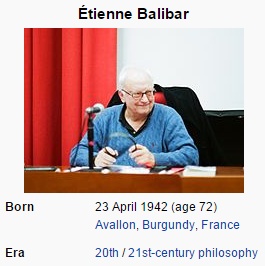
Life[edit]
Balibar was born in Avallon, Yonne, Burgundy, and first rose to prominence as one of Althusser's pupils at theÉcole Normale Supérieure. He was a participant in Louis Althusser's seminar on Karl Marx's Das Kapital. This seminar resulted in the book entitled Reading Capital, co-authored by Althusser and his students, among whom Althusser considered Balibar to be the foremost contributor. Balibar currently teaches philosophy and political theory at Paris X Nanterre, University of California, Irvine and Kingston University.
His daughter is the actress Jeanne Balibar.
Work[edit]
In Masses, Classes and Ideas, Balibar argues that in Das Kapital (or Capital), the theory of historical materialism comes into conflict with the critical theorythat Marx begins to develop, particularly in his analysis of the category of labor, which in capitalism becomes a form of property. This conflict involves two distinct uses of the term "labor": labor as the revolutionary class subject (i.e., the "proletariat") and labor as an objective condition for the reproduction of capitalism (the "working class"). In The German Ideology, Marx conflates these two meanings of labor, and treats labor as, in Balibar’s words, the “veritable site of truth as well as the place from which the world is changed..."
In Capital, however, the disparity between these two senses of labor becomes apparent. One manifestation of this is the virtual disappearance in the text of the term "proletariat." As Balibar points out, the term appears only twice in the first edition of Capital, published in 1867: in the dedication to Wilhelm Wolff and in the two final sections on the "General Law of Capitalist Accumulation". For Balibar, this problem implies that "the emergence of a revolutionary form of subjectivity (or identity)... is never a specific property of nature, and therefore brings with it no guarantees, but obliges us to search for the conditions in a conjuncture that can precipitate class struggles into mass movements...". Moreover, "[t]here is no proof… that these forms are always and eternally the same (for example, the party-form, or the trade union)."
In "The Nation Form: History and Ideology,"[1] Balibar critiques modern conceptions of the nation-state. He states that he is undertaking a study of the contradiction of the nation-state because "Thinking about racism led us back to nationalism, and nationalism to uncertainty about the historical realities and categorization of the nation" (329).
Balibar contends that it is impossible to pinpoint the beginning of a nation or to argue that the modern people who inhabit a nation-state are the descendants of the nation that preceded it. Balibar argues that, because no nation-state has an ethnic base, every nation-state must create fictional ethnicities in order to project stability on the populace:
"the idea of nations without a state, or nations 'before' the state, is thus a contradiction in terms, because a state always is implied in the historic framework of a national formation (even if not necessarily within the limits of its territory). But this contradiction is masked by the fact that national states, whose integrity suffers from internal conflicts that threaten its survival (regional conflicts, and especially class conflicts), project beneath their political existence to a preexisting 'ethnic' or 'popular' unity" (331)
In order to minimize these regional, class, and race conflicts, nation-states fabricate myths of origin that produce the illusion of shared ethnicity among all their inhabitants. In order to create these myths of origins, nation-states scour the historical period during which they were “formed” to find justification for their existence. They also create the illusion of shared ethnicity through linguistic communities. That is, when everyone has access to the same language, they feel as if they share an ethnicity. Balibar argues that "schooling is the principal institution which produces ethnicity as linguistic community" (351). In addition, this ethnicity is created through the "nationalization of the family," meaning that the state comes to perform certain functions that might traditionally be performed by the family, such as the regulation of marriages and administration of social security.



